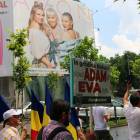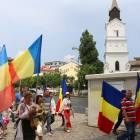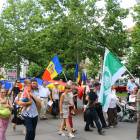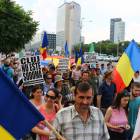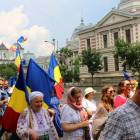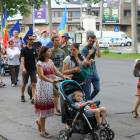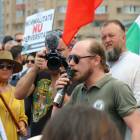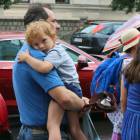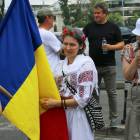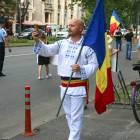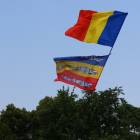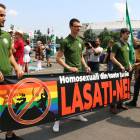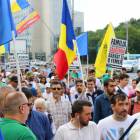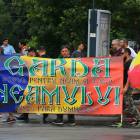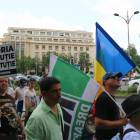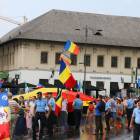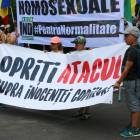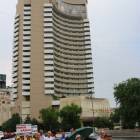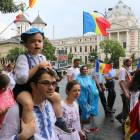Romanians take to the street in defense of traditional family
In anticipation of the annual LGBT Pride parade in Bucharest, hundreds of Romanians marched in favor of traditional family. The number of participants was anywhere between 500 and 1.000 people, a relatively low number, which organizers blame on what they deem as a complete media blockade against the event. In October 2018, a referendum was held, after civic organizations gathered millions of signatures. The aim was to change the ambiguous definition of a family, written in the Constitution, from the union of „two spouses” to „a union of one man and one woman”. Romanian civil law bans gay marriages for now, but a couple of two man married in another EU country tried to gain legal recognition of their marriage through a court decision. Fearing that the LGBT lobby and international pressure will eventually convince politicians to modify legislation in Parliament, without consulting the people, conservative activists called for that referendum, to make gay marriages impossible without another referendum. The referendum for family in 2018 failed, although it managed to gather 3.8 million voters to the polling stations, of which 92% voted in favor of traditional family. But all political parties and mainstream media, more or less, boycotted the referendum, which was without effect because it didn’t gather the needed attendance. The score in itself is the highest for traditional family in a referendum of this sort in Europe, in recent years. But it’s very hard to estimate what is the percentage of people who actively rejected it’s idea or simply considered it an issue of no importance. However, it underlined again the status of Romania as one of the most conservative societies in Europe, with a 90% Christian population, most of them belonging to the (Greek) Orthodox Church.
The country joined European Union in 2007 and pressure to change in various ways intensified. The law that punished homosexual acts performed in public was dropped in 2001, but the largely progressive mainstream media of Romania constantly pleaded for more rights for the otherwise very small in number gay community. Several gay celebrities, especially from fashion industry and media were promoted in the decades following the Revolution of 1989. Also, in the 90s, the first sex change operation was made. In the last decades, the proposition for “civil partnerships” was raised more often, a project that conservative Romanians fear it’s just a first step towards full recognition of gay marriage and adoption rights.
The exodus of population after the admittance into the EU, which determined anywhere between 3 to 5 million Romanians to look for work in Western countries, also brought mixed opinions on the subject. While some embraced Western mentality of tolerance and call for Romanians to modernize, others warn about what they consider a decadent lifestyle promoted in excess, about demographic decline and about the growing censorship of political correctness on Facebook and in real life.
A Committee Against Discrimination was formed a decade ago in Romania, giving fines for declarations and actions against minorities. And sexual minorities have been included on the list. But this state institution is not the only one that punishes opinions. Remi Mănoiu is one of the latest victims of political correctness. With his Rasta dreadlocks hair, he was an unusual presence at this rally. He used to work as a bar-tender in a pub in Bucharest, which the owners gradually turned into a gay bar. Remi didn’t have any conflict with the clients or his employers, but he posted opinions in favor of the referendum for family on his Facebook page and later announced he will attend this rally. LGBT activists took notice of this and threatened to boycott the pub. So the owners had to choose and eventually fired Remi for his online opinions.
As was the case with the referendum of last year, no mainstream politician or party wanted to be associated with this rally. The only party that waved flags in front of the Government on Saturday was The New Right, a small movement, that failed to raise the number of signatures needed to run in the last European elections, held last month. (Romania is probably the only country of the 28 block that didn’t send any euro-skeptic deputy in the EU Parliament this round.) The leader of the New Right Party, a 41 years old lawyer, Tudor Ionescu, spoke at the manifestation against state involvement in organizing Pride Parade in the largest cities of the country. He claimed participants are moved around from Cluj to Timișoara and Bucharest, accusing the Government and Romanian Institute for Culture (a state agency) of sponsoring transport and accommodation for such manifestations.
President Klaus Iohannis, who called the 3.000.000 people who signed for the referendum „religious fanatics” was also criticized on one banner. Another banner, held by children, read: Stop the attack on children’s innocence. This hints to a proposed strategy of introducing sex-education classes and gender studies for low grade students, debated by the Ministry of Education. Another banner was against the proposed law of civil partnership.
The organizers were groups of people active on Facebook with Christian and Nationalist leanings. The Orthodox Church did not get involved in the protest, although 2 or 3 priests could be spotted in the crowd. By tradition, Romanian Orthodox Church is a discrete institution that shies away from social issues on debate and rarely voices opinions on issues of private life, on which its opinions have remained otherwise unchanged for centuries. Even in the case of the referendum, it was rather civil society and groups from Protestant minority, inspired by similar American movements, that initiated the process. But the Orthodox Church eventually encouraged people to sign up and in the last weeks before the vote, asked people to vote in favor of the “man and woman” definition of marriage.
Religious and nationalistic themes intertwined at the rally, where many came dressed in folkloric costumes waving national flags. The chant of one speaker: “Family, fatherland, God and nation!” was rapidly picked up with enthusiasm by the crowd. Other chants said Romania is not Sodom or that natural family is a divine law. “Mother, father, brother sister, not Sodom and Gomorrah!” or “In the Garden of Eden, only Adam and Eve” were also Biblical references.
Those present went marching through the center of Bucharest, passing from Victoria Square, in front of the Government, to Roman Square, near the Economics College, to the University Square. After reaching Unification Square, the rally ended at the foothill of the Orthodox Patriarchy. The weather was extremely hot, of over 33 degrees Celsius, with a short summer rain in the middle of the rally. Strangely, no rainbow appeared on the sky after that.
Mai multe despre: Events • conservative • family • LGBT • traditional- Home Page
start page - Architecture
landmark buildings - Sacred architecture
places of worship - Nature
landscape photography - Concert
performing artists - Christmas
Santa Claus pictures
- Jooble
jobs for photographers - Escape
an out of control blog - Merry Christmas
The best organizer of Christmas parties - Astro photo
Eclipse hunting and astrological photography

